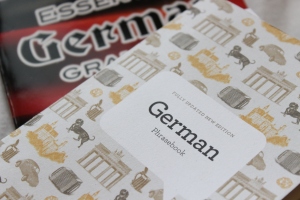 Many au pairs choose a host country in order to learn a new language. A second language can improve career prospects, enrich one’s life and broaden one’s horizons. My personal belief is that in knowing a country’s national language and speaking it with locals earns respect and helps an au pair transition from being viewed as a “tourist” to a “cosmopolitan”. However, upon arrival, using your skills can be intimidating, confusing and difficult. Even when you have all the words, sometimes the confidence to say them aloud disappears. As a language lover, I feel everybody deserves the privilege of saying “Hi, my name is X and I can speak two languages”. Or better yet, three/four/five/eleven/one hundred. I want to share with you some of my own tips and tricks for learning a new language.
Many au pairs choose a host country in order to learn a new language. A second language can improve career prospects, enrich one’s life and broaden one’s horizons. My personal belief is that in knowing a country’s national language and speaking it with locals earns respect and helps an au pair transition from being viewed as a “tourist” to a “cosmopolitan”. However, upon arrival, using your skills can be intimidating, confusing and difficult. Even when you have all the words, sometimes the confidence to say them aloud disappears. As a language lover, I feel everybody deserves the privilege of saying “Hi, my name is X and I can speak two languages”. Or better yet, three/four/five/eleven/one hundred. I want to share with you some of my own tips and tricks for learning a new language.
When You’re Just Starting Out:
- Enroll in a Language course. In some countries, your host parents are responsible for bearing part or all of the cost of your language course. Sometimes, the au pair pays for his or her own course. Discuss what your HPs are comfortable paying as early as possible, and before you arrive, have a little money put away specifically for a language course.Universities, libraries and tourist information centres can usually provide information on local options. Alternatively, research free and low-cost options online.
- Watch TV and movies with subtitles on. I tried subtitles-free learning through movies, but I found the combination of hearing a word aloud and reading it in my native language helped me expand my vocabulary faster.
- Learn to spell. Understanding the spelling of words is vital to understanding their meanings. As you learn to spell, you may have an easier time relating words in your new language back to those in your own language. This will also help you begin to distinguish advjectives/adverbs/nouns and verbs based on their endings (-ly as in friendly becomes -lich in freundlich, and also appears in farblich, and sportlich; these are all adjectives).
- Try to read the kids books. They may not have the patience for you to read to them while you’re still stumbling over words, but, just like in primary school, the pictures will help clarify the meaning of the words.
- Listen to music. Learn some songs in your new language, and sing along!
When you’re more advanced:
- Speak with your host parents. Often, au pairs find it difficult to use a non-native language with their host parents, even when they use it with kids, at the supermarket and in the bar. Tell them that you’re enthusiastic about learning. Ask them to speak slowly if necessary. Initiate the conversation yourself, so that you feel in control. Start when they first come home from work by asking how their day was, and use topics you’re comfortable with, such as weather, kids or food.
- Get a library card. Libraries make great outings for kids, too! Young adult novels are great for practicing a new language because they have interesting plots but the diction usually isn’t too high.
- Join a conversation group or find a tandem partner. Tandem partners are people who want to learn your language and are native speakers of a language you want to learn. Conversation groups are similar, but usually involve more people and a mix of native and non-native speakers. check Facebook and Google for nearby opportunities.
- Write in your journal using your new language. This is great practice and helps you learn to think in a second language the same way you would with your first language.
Growing through another language is a magical experience. Learning the local language in your host country is one of the ways to make the most of your au pair year; you’ll be exposed to a deeper understanding of the culture you otherwise wouldn’t have. Have fun, and Good luck!